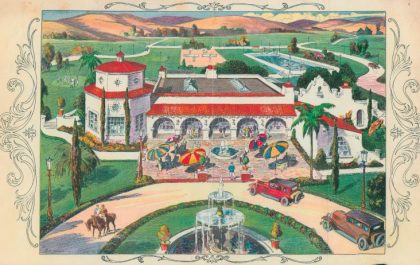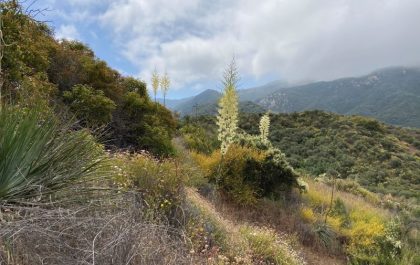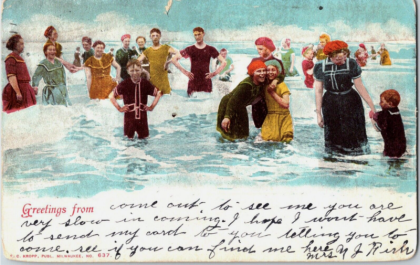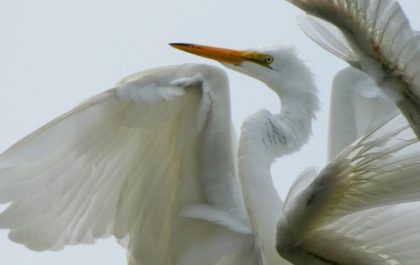Nature’s Grand Hotel has its Season, like the others. As the guests one by one pack, pay, and depart, and the seats at the table-d’hotel shrink pitifully at each succeeding meal; as suites of rooms are closed, carpets taken up, and waiters sent away; those boarders who are staying on, en pension, until the next year’s full re-opening, cannot help being somewhat affected by all these flittings and farewells, this eager discussion of plans, routes, and fresh quarters, this daily shrinkage in the stream of comradeship. One gets unsettled, depressed, and inclined to be querulous. Why this craving for change?
—Kenneth Grahame, “Wayfarers All,” The Wind in the Willows
The end of summer isn’t quite as dramatic in coastal Southern California as it was in Kenneth Grahame’s English countryside, but summer is winding down even here. The hottest weeks of the year may still be ahead of us in September, but change is in the air.
This is the season of spiders. Orb weavers are everywhere, spinning their gossamer webs across every trail and walkway. The first person out of the house each morning risks walking face-first into the net—not the prey the spider had anticipated, although these small predators are ambitious, subduing insects many times their size.
Tarantulas are on the march this time of year, too. Males can travel miles in search of a female. Unfortunately, that single-minded pursuit of romance can take them into people’s houses. The best way to deal with one is to gently scoop it into a dustpan or wastepaper basket and transport it outside to continue its journey. These giant spiders may look alarming but they are mild mannered and gentle, far more likely to be harmed by humans than to do any harm themselves.
The great horned owl pair who nest in our neighbor’s eucalyptus tree had just one chick this year. Their child is now venturing out on her own each night. Her complaints to her parents about the challenges of hunting fill the night air with an astonishing range of shrieks and grumbles that sound nothing like the sedate “who, who?” of the adults. The young coyotes in the canyon have a similar complaint, but their parents are nearby to offer reassurance.
Human children are spreading their wings, too. The school year is underway at almost all of our local schools. The last of the college students have driven off in pursuit of the future, their cars packed with dreams and aspirations as well as with clothes, bedding, and cherished possessions.
Summer vacation is over for many, but the change of seasons brings a certain restlessness, a desire for new horizons—an echo, perhaps, of a time when humans also migrated with the changing seasons. Here at Topanga New Times, several of our travelers are still on the road. We’ll be hearing more about their adventures, as they continue to contribute postcards from the road for those of us who have remained at home.
Labor Day, the unofficial end of summer, is coming up fast but perhaps not fast enough for residents whose lives are impacted by beach traffic. Weekends will remain busy until and if the rainy season arrives, but weekday beach traffic has already diminished slightly.
COVID-19 continues to cast a shadow over many aspects of life, but it, too, has diminished slightly. Although transmission rates remain high in Los Angeles County, hospitalizations have declined. The California legislative session ends August 31. An assortment of coronavirus bills proposed during the winter surge, including one that would have required mandatory vaccines for school children, have failed to gain support and will likely be shelved. We are still charting a course through the pandemic. No one knows what the winter will bring, but the most draconian measures appear to be off the table in California, at least for now.
Early risers this week will be treated to the sight of four bright planets in the predawn sky. Look for Saturn, Jupiter, Venus and Mars. Venus, the brightest of the four, will be vanishing in the glare of the sun in a few weeks, but will be back this winter in the planet’s role as the Evening Star. Mars will get brighter and brighter as the Red Planet approaches opposition in early December—the point at which it is opposite the sun from Earth’s perspective. Saturn, which reached opposition on August 14, is already beginning to fade. We travel around the sun faster than the outer planets, which is why they appear brighter or dimmer throughout the year.
Whether we think about it or not, we are always in motion. The earth rotates once every 23 hours, 56 minutes and 4.09 seconds. At the equator, the surface of the earth moves at a speed of 460 meters every second, or approximately 1,000 miles an hour. It’s a reminder that we are all travelers, even those of us who querulously resist change and the pull of the seasons that makes so many of our fellow creatures restless. We are wayfarers all.












